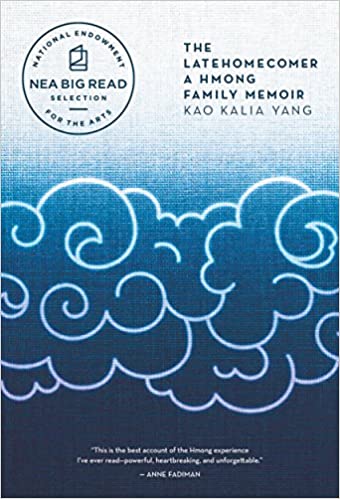
The Latehomecomer by Kao Kalia Yang
One in a series of reviews contributed by Chancellor Dwight C. Watson
When I first moved to St. Paul, Minnesota from Raleigh, North Carolina in 1997, I worked at Hamline University in St. Paul. Across the street was Hancock-Hamline Collaborative Magnet School. The school had many Hmong students attending, and I was not aware of this nationality. The principal provided me a history lesson about how the Hmong people who lived in the mountains of Laos helped the Americans fight against the Viet Cong during the Vietnam War. The Viet Cong were members of the communist guerrilla movement in Vietnam that fought the South Vietnamese government forces 1954–75 with the support of the North Vietnamese army and opposed the South Vietnamese and US forces in the Vietnam War. The Hmong’s participation in the combat against the Viet Cong was called the Secret War. When the war was over, many Hmong were stranded in the mountains of Laos and were attacked by the Viet Cong without the assistance of the American forces.
The principal taught me this history lesson by referring to a large, colorful Hmong story cloth that was proudly displayed in her office. From that point on, I was fascinated with the Hmong culture, and I learned all I could by reading, researching, and attending cultural events like Hmong New Year, Hmong 4th of July Festival, Hmong and Southeast Asian restaurants, and participating in many community events. Eventually, I had the good fortune to travel to Laos, Vietnam, Cambodia, and Thailand and saw for myself the mighty Mekong River. This was the river that many Hmong people had to survive the crossing of to get from Laos to Thailand where there were many refugee camps.
In 2008, I had the honor of reading The Latehomecomer and learning more deeply about Hmong culture. I found it to be an inspiring memoir of the Hmong author’s flight from post-Vietnam terror in Laos and Thailand to the United States. Since the author was a former student of Hamline University, the University invited her to speak to our students about the book. Recently, I had the opportunity to read the book again as a part of the Whitewater Big Read initiative. It was exciting to revisit the language of the author that often flowed like poetry. As a culmination of the reading of the book, we had an opportunity to have a WebEx with Kao Kalia Yang, and her presentation was resplendent with story, recitation, reflection, and artistry. I was so glad that our paths had come full-circle.
Through my second reading of the book and listening to Kao Kalia Yang present her personal accounts of the Yang’s family escape across the Mekong River into Thailand, I was again captured by the lyrical nature of the memoir. The strongest part of Yang’s memoir is the account of her early years, most occurring before her birth in 1980 in a Thai refugee camp. Delivering her was her paternal grandmother, who emerges as a figure of towering importance to the author. The survival of the family was nearly miraculous; flood, disease, poverty, hunger, violence and despair all threatened them continually. In 1987 they finally arrived in Minnesota, where they faced new struggles. During the ensuing 20 years, the parents worked ferociously, the children succeeded academically, and the American Dream, in many tangible ways, was realized.
“Yang has performed an important service in bringing readers the stories of a people whose history has been shamefully neglected,” writes Kirkus. “Yang tells her family’s story with grace; she narrates their struggles, beautifully weaving in Hmong folklore and culture. By the end of this moving, unforgettable book, when Yang describes the death of her beloved grandmother, readers will delight at how intimately they have become part of this formerly … [unfamiliar] culture.”
Publisher’s Weekly, starred review
